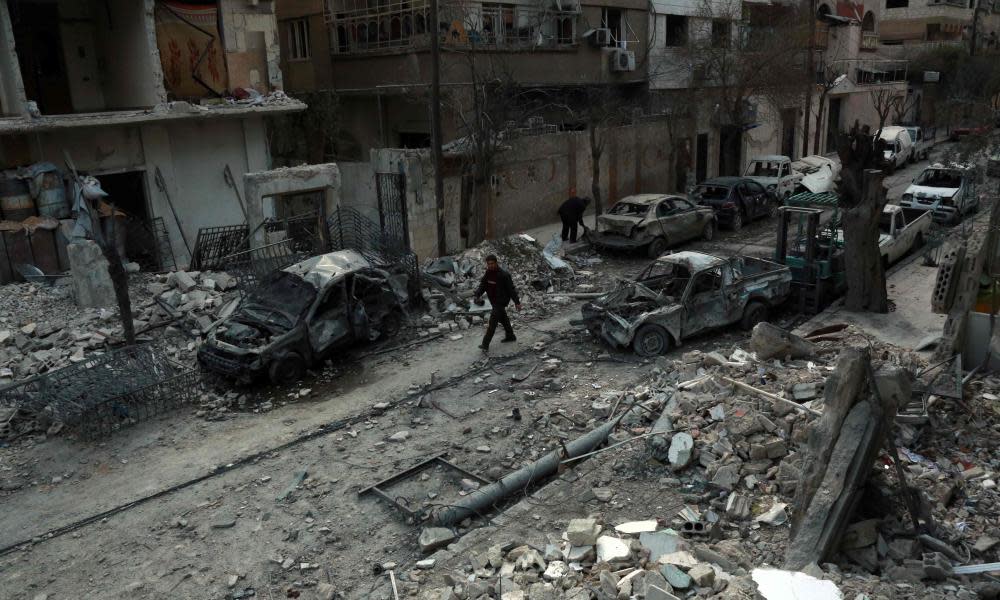Syria's return to bombing-as-usual is down to Russia

The first signs from eastern Ghouta are not encouraging. A day after the UN security council finally agreed a ceasefire, it was back to bombing-as-usual for Syria’s regime. It is as though the vote for a truce in the besieged enclave, so long in coming and so contentious, never happened at all.
Bashar al-Assad, Syria’s president, is primarily culpable. He probably no longer cares what the world thinks. He has no reputation to lose. Perhaps he calculates one final push by his ground forces will finish the rebels, before a ceasefire takes hold.
But the larger burden of responsibility lies with Russia. It was Vladimir Putin who rescued Assad in 2015 when he was losing the war. Russia’s president has protected his Syrian poodle from war crimes charges and blocked inquiries into his use of banned chemical weapons. Putin has bathed in the kudos of seeming to supplant the US as the Middle East’s big mover and shaker. When Israel and Iran got into a scrap in Syrian airspace recently, it was Putin, not Donald Trump, who phoned Jerusalem and told Benjamin Netanyahu to knock it off.
Eastern Ghouta is the last rebel-held enclave bordering the Syrian capital, Damascus. Since 2013, forces loyal to President Bashar al-Assad have imposed a suffocating and deadly siege on the area. Yet several insurgent factions have retained control.
This month, Syria’s army launched one of the most intense bombardments of the war, saying their assault was necessary to end rebel mortar strikes on the capital. Residents accuse Russia of also bombing Ghouta, a mixture of dense suburbs and fields that once served as the breadbasket for Damascus.
And it was Putin who delayed the UN ceasefire last week, even as Ghouta’s children were dying, watering down its provisions. He ensured, in effect, that anybody Assad deems a “terrorist” is still fair game for his barrel bombers. That is why the fighting continues unchecked.
The Syrian conflict began as a popular, internal uprising against a dictator. But since Russia jumped in militarily it has become Putin’s war. It is Moscow’s biggest foreign military adventure since the 1979 Soviet invasion of Afghanistan. Remember how that ended.
Putin owns the Syria conflict, in the same way Lyndon Johnson owned Vietnam. Russian forces are not committed on the ground to a similar degree. But Russia’s global prestige, geo-strategic interests and political and military credibility are now inextricably linked to Assad. Increasingly that looks like a bad bet that Putin cannot afford to lose.
Syria is a shocking, baffling mess. For ordinary Russians, it is a waste of men and money. For a watching world, appalled by scenes of relentless brutality and cruelty in Ghouta, Aleppo, and a thousand other towns and cities, it is Putin’s mess. It’s up to him to fix it.
Putin is learning if you want to be a global power again, you have to lead globally. That is why Angela Merkel and Emmanuel Macon were on the phone on Sunday, demanding he ensure the ceasefire works. After all the fuss Russia made, the entire UN expects it.
Putin faces a presidential election on 18 March. If Russia were a functioning democracy, not a corrupt oligarchy, he could be out on his ear.

 Yahoo News
Yahoo News 
